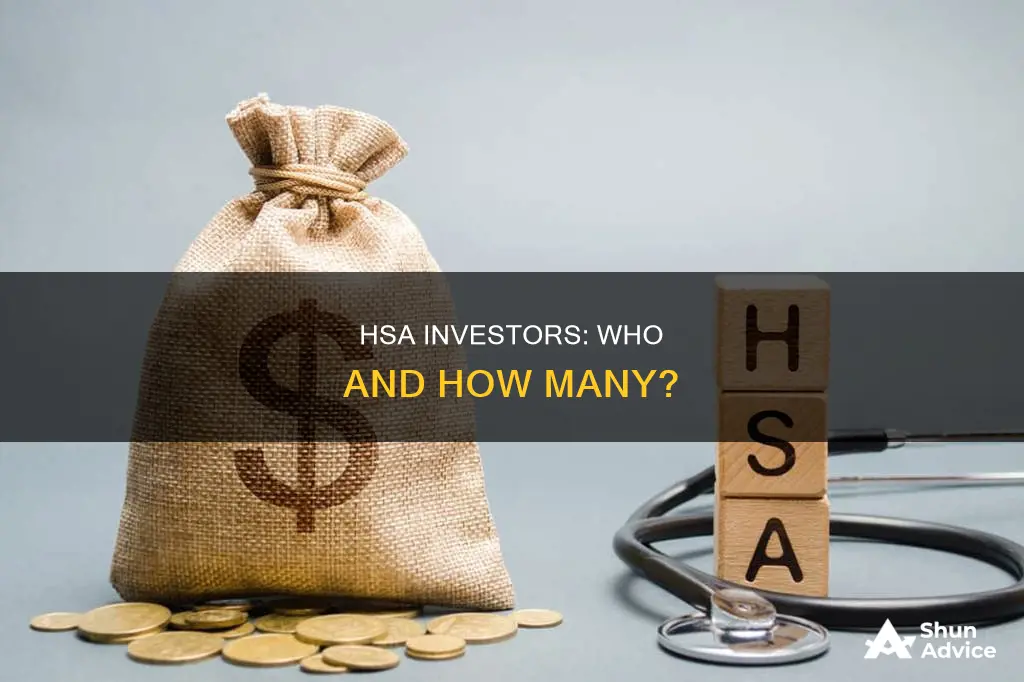
Health savings accounts (HSAs) are a great way to save for future medical expenses or boost your retirement funds. In 2020, only 9% of people with HSAs chose to invest their funds, according to a report by the Employee Benefits Research Institute. This is surprising, given the triple tax benefit of HSAs: tax-deductible contributions, tax-free growth, and tax-free withdrawals for qualified medical expenses. By investing HSA funds, individuals can take advantage of these tax benefits and grow their savings faster than by saving alone. However, some HSA providers require high account minimums for investing, and individuals must be on a high-deductible plan to be eligible for an HSA.
| Characteristics | Values |
|---|---|
| Percentage of people with HSAs who invest their assets | 9% in 2020, according to the Employee Benefits Research Institute |
| Percentage of people with HSAs who hold their assets in cash | 91% in 2020 |
What You'll Learn

HSA funds can be used to pay for current or future medical expenses
A Health Savings Account (HSA) is a tax-advantaged account that allows you to pay for current and future medical expenses. HSAs offer a triple tax benefit: contributions are tax-deductible, growth is tax-free, and withdrawals for qualified medical expenses are not taxed. This makes HSAs an attractive option for saving for future health-related expenses.
With an HSA, you can set aside money on a pre-tax basis to pay for qualified medical expenses, such as deductibles, copayments, and other out-of-pocket costs. HSA funds can be used to pay for a variety of medical services, including doctor's visits, mental health services, eye care, and dental expenses. Additionally, HSA funds can be used to pay for certain covered services and items each year before your health plan starts to pay, except for free preventive services.
One of the benefits of HSAs is that unspent funds roll over from year to year, allowing you to accumulate a balance over time. This means that you can hold and add to your tax-free savings, which can be used to pay for medical care in the future. HSAs may also earn interest or other earnings, which are not subject to taxation.
It is important to note that there are restrictions on how HSA funds can be used. Generally, HSA funds cannot be used to pay for health insurance premiums. Additionally, if HSA funds are used for non-qualified expenses, you may be subject to a penalty and taxes on the withdrawal. However, once you reach the age of 65, the restrictions on HSA funds are lifted, and you can use the money for any purpose without penalty.
Mutual of America: Worth the Investment?
You may want to see also

HSA funds can be invested in stocks, bonds, and mutual funds
A health savings account (HSA) is a tax-efficient way to save for future medical expenses. HSAs are available to those with a high-deductible health insurance plan, and they help pay for out-of-pocket medical expenses. In 2023, the minimum deductible for an individual was $1,500, and $3,000 for a family. These deductibles will rise to $1,600 and $3,200, respectively, in 2024. HSAs come with a triple tax benefit: contributions are tax-deductible, growth is tax-free, and withdrawals for qualified medical expenses are also tax-free.
HSA funds can be invested in stocks, bonds, mutual funds, and ETFs. Some HSAs offer tools to help you choose your investments and provide automatic rebalancing, while others allow you to select specific investments.
When determining how to invest your HSA funds, it's important to consider your unique circumstances, including your risk tolerance and potential future medical needs. If you're using an HSA mainly as a retirement account, opting for high-return investments may make sense. Here are some options to consider:
- Index funds: These funds allow investors to purchase a diversified group of stocks that track indexes such as the S&P 500 or Russell 2000. They have low fees, and are available as both mutual funds and ETFs.
- Dividend funds: These funds hold dividend-paying stocks, which are typically from profitable and established companies. Dividends won't be taxed and can be reinvested or held as cash.
- Individual stocks: This is the riskiest approach as it involves holding a small number of stocks. It's important to understand the business model, competitive position, and valuation of any company you invest in.
- Short-term bond funds: These funds are a good option for those with a lower risk tolerance or who anticipate future medical expenses. They generate cash and are relatively stable, minimizing the impact of fluctuating interest rates.
While investing HSA funds in stocks, bonds, and mutual funds can be a great way to grow your savings, it's important to remember that you should only focus on retirement if you can cover medical expenses with other funds.
Makeup Investment: Who's Spending?
You may want to see also

HSA funds grow tax-free
Health savings accounts (HSAs) are a great way to save for future medical expenses or boost your retirement funds. HSAs offer a triple tax benefit, meaning contributions are tax-deductible, growth is tax-free, and withdrawals for qualified medical expenses are also tax-free.
The triple tax benefit of HSAs is a significant advantage over other retirement accounts, which are taxed either when funds go into the account or when they are withdrawn. With an HSA, you can contribute pre-tax dollars directly from your paycheck, lowering your overall taxable income. The money in your HSA grows without being subject to taxes, and you can make tax-free withdrawals at any time to pay for qualified medical expenses. This includes deductibles, copayments, prescriptions, vision, and dental care.
The tax-free growth of HSA funds is especially beneficial for long-term savings. Any interest or earnings on your HSA account are tax-free, which can add up to more money to use for qualified health expenses. This is why utilizing the investing feature of your HSA account is an important component of your long-term financial plan.
If you are considering investing your HSA funds, it is important to determine how much cash you want to keep in your HSA to cover near-term expenses. This will depend on your expected medical expenses and your comfort level in handling those expenses. Once you have estimated your cash target, you can consider investing the rest for long-term growth.
There are several options for investing your HSA funds, including stocks, bonds, mutual funds, and ETFs. You can choose to invest in low-risk, low-return options such as money market funds, or opt for higher-return but higher-risk choices such as stocks. It is important to consider your unique circumstances, risk tolerance, and potential future medical needs when deciding how to invest your HSA funds.
Crypto Investors: How Many?
You may want to see also

HSA funds can be withdrawn tax-free for qualified medical expenses
A Health Savings Account (HSA) is a tax-advantaged account that allows you to pay for qualified medical expenses without being taxed on that money. This is a triple tax benefit: HSA contributions are tax-deductible, the money grows tax-free, and withdrawals for qualified medical expenses aren't taxed either.
The money in your HSA can be used to pay for a variety of current and future medical expenses, including deductibles, copayments, dental, drug, and vision expenses. You can also use the funds to pay for long-term care.
The triple tax benefit of an HSA means that your contributions are tax-deductible, and the money grows tax-free. Withdrawals for qualified medical expenses are also tax-free. This means that you won't pay any taxes on the money you put into the account, the interest it earns, or when you withdraw it for qualified medical expenses.
The tax advantages of HSAs make them a powerful tool for saving for future health-related expenses. However, it's important to note that there are restrictions on who can contribute to an HSA and how the funds can be used. To contribute to an HSA, you must be enrolled in a high-deductible health plan and meet certain other requirements. Additionally, HSA funds can only be used for qualified medical expenses to avoid tax penalties.
If you spend your HSA funds on non-qualified expenses, you may be charged a penalty in addition to income taxes on the withdrawal. However, once you reach age 65, you can use the money in your HSA for anything you want without penalty, but you will be required to pay ordinary income tax on withdrawals for non-qualified expenses.
Investing During Depressions: Strategies for Success
You may want to see also

HSA funds can be rolled over from year to year
Health savings accounts (HSAs) are a great way to save for future medical expenses or boost your retirement funds. One of the most attractive features of HSAs is that they offer a triple tax benefit. Contributions to HSAs are tax-deductible, earnings on the account remain tax-free as long as they are used for qualified medical expenses, and withdrawals for qualified medical expenses are also tax-free.
Another advantage of HSAs is that they allow you to roll over unused funds from year to year. This means that if you have any money left in your HSA at the end of the year, it will automatically roll over to the next year. There is no "use-it-or-lose-it" provision, as is the case with flexible spending accounts (FSAs). This feature makes HSAs a great way to save for future healthcare expenses or retirement, as your unused contributions will continue to accumulate over time.
In addition to rolling over unused funds, you also have the option to invest your HSA funds in a variety of stocks, bonds, and mutual funds. This allows your HSA balance to grow even faster and maximize your savings. However, it's important to note that not all HSA providers offer the same investment options, and some may have high account minimums for investing.
When it comes to investing your HSA funds, it's important to consider your unique circumstances, including your risk tolerance and potential future medical needs. If you're using your HSA mainly as a retirement account, you may opt for high-return investments such as stocks. On the other hand, if you have a lower risk tolerance or expect to need money for medical expenses in the near future, you may want to focus on more conservative investments such as short-term bond funds or money market funds.
It's also worth mentioning that you are not required to stick with the same HSA provider forever. If you find a different provider with lower fees or better investment options, you can do an HSA rollover to transfer your funds to the new provider. This can be done through a check-based method or a trustee-to-trustee transfer, and it is not considered a taxable event as long as it follows IRS regulations.
In conclusion, HSAs offer a great way to save for future medical expenses or boost your retirement funds, with the added benefit of tax advantages and the ability to roll over unused funds from year to year. By investing your HSA funds wisely and taking advantage of the rollover feature, you can maximize your savings and ensure you have the funds you need for future healthcare costs.
UK Investors: Who and How Many?
You may want to see also
Frequently asked questions
A health savings account (HSA) is a tax-advantaged account that allows you to pay current medical bills, save for future medical expenses, and invest in a variety of stocks, bonds, and mutual funds.
HSAs come with a triple tax benefit: contributions are tax-deductible, earnings on the account remain tax-free as long as the money is used for qualified medical expenses, and withdrawals for qualified medical expenses are also tax-free.
You can invest HSA funds in a variety of stocks, bonds, and mutual funds, and other investment options. Some HSA providers may require a minimum account balance before allowing you to invest. It's important to consider your risk tolerance and future medical needs when deciding how to invest your HSA funds.
Yes, you can still withdraw your HSA funds for eligible medical expenses even if you invest them. However, you may need to allow a few business days for the funds to be available for use.
There may be internal expenses and short-term redemption fees associated with mutual funds within your HSA. However, there are typically no transaction fees for buying or selling investments, and no fees to enroll in the investment account.







